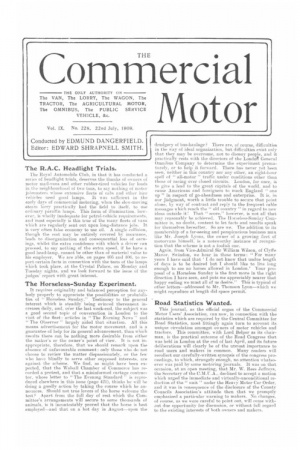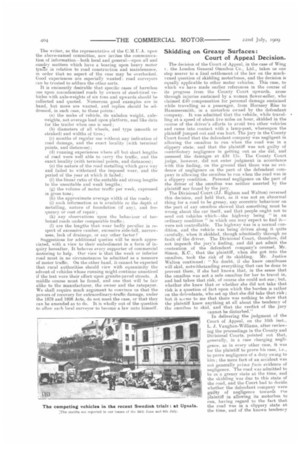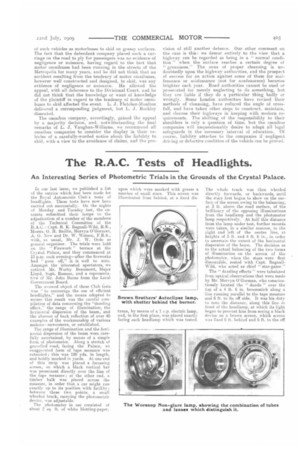The R.A.C. Headlight Trials.
Page 1

Page 2

Page 3

If you've noticed an error in this article please click here to report it so we can fix it.
The Royal Automobile Club, in that it has conducted a series of headlight trials, deserves the thanks of owners of motor mad-vans and ether rubber-tired vehicles for loads in the neighbourhood et two tons, to say nothing of motor jobmasters whose extensive fleets of cabs and other hire vehicles need good lumps. It was sufficient in the early days of commercial motoring, when the slow-moving steam lorry practically had the field to itself, to use ordinary paraffin in nips. This form of illumination, however, is wholly inadequate for petrol-vehicle requirements, and most especially is this true of the many fleets of vans which are regularly sent out upon long-distance jobs. It is very often false economy to use oil. A single collision, though the cost may be entirely covered by insurance, leads to disorganization and consequential loss of earnings, whilst the extra confidence with which a driver can proceed, to say nothing of the extra spe,ed, if he have a good head-lamp, cannot be other than of material value to Ids employer. We are able, on pages 405 and 406, to report certain facts in connection with the tests of the lamps which took place, at the Crystal Palace, on Monday and Tuesday nights, and we look forward to the issue of the judges report with great interest.
The Horseless-Sunday Experiment.
It requires originality and balanced perception for anybody properly to appreciate the possibilities or probabilities of " ITorseless Sunday." Testimony to the general interest which is steadily being evinced thereanent increases daily, and, over the last week-end, the subject was a good second topic of conversation in London to the visit of the fleet: articles in " The Evening News " and " The Observer " largely aided that situation. All this means advertisement for the motor movement, and is a guarantee of help for its general advancement, than which results there can be nothing more desirable from either the maker's or the owner's point of view. 'ft is not inappropriate, therefore, that we should remark upon the absence of unfavourable comment: only those who do not choose to review the matter dispassionately, or the few who have blindly to serve other supposed interests, are against the scheme. We find, Its might have been expected, that the Walsall Chamber of Commerce has recorded a protest, and that a misinformed cartage contractor, whose letter to " The Evening Standard " is reproduced elsewhere in this issue (page 421), thinks he will be doing a goodly action by taking the course which he announces. Should not true lovers of the horse welcome the test? Apart from the full day of rest which the Committee's arrangements will secure to some thousands of animals, is it incontestably proved that the horse is best employed—and that on a hot day in August—upon the drudgery of bus-haulage There are, of course, difficulties
in the way of ideal urganization, but difficulties exist only that they may be overcome, not to dismay people, and it practically rests with the directors of the London General Omnibus Company to determine the experiment prematurely, or to help it forward. There has never yet been seen, neither in this country nor any other, au eight-hour spell of " all-motor " traffic under conditions other than those of racing over closed circuits. London, for once, is to give a lead to the great capitals of the world, and to cause Americans and foreigners to mark England " one up " in respect of go-abeadness and enterprise. It is, in our jlidgment, worth a little trouhle to secure that point alone, by way of contrast and reply to the frequent cable messages which reach the " old country " in regard to new ideas outside it That " score," however, is not all that may reasonably be achieved. The Homeless-Sunday Committee is, no doubt, content to let facts and results speak for themselves hereafter. So are we. The addition to its membership of a far-seeing and perspicacious business man like Mr. Joseph -Lyons, the owner of a growing fleet of motorvans himself, is a noteworthy instance of recognition that the scheme is not a foolish one.
Again, from Vice-Admiral Sir William Wilson, of Clyffe Manor, Swindon, we hear in these terms: " For many years I have said that 'I do not know that undue length of days is to ho desired but I should like to live long enough to see no horses allowed in London.' Your proposal of a Horseless Sunday is the first move in the right direction I have seen, and puts me appreciably nearer that happy ending we mast all of us desire." This is typical of other letters—addressed to Mr. Thomson Lyon—which we might reproduce at length did space permit.
Road Statistics Wanted.
This journal, as the official organ of the Commercial Motor Users' Association, can now, in connection with the statistics which are required by the Central Committee for Road Statistics, most fittingly again turn to account its unique circulation amongst owners of motor vehicles and tractors. This committee, with Lord Helper as its chairman, is the practical outcome of the Road Congress that was held in London at the end of last April, and its future deliberations will clearly be of the utmost importance to road users and makers in common. Many readers will recollect our carefully-written synopsis of the congress proceedings, to which, strangely enough, no attention whatsoever was paid by some motoring journals. It was on that occasion, at an open meeting, that Mr. W. Rees Jeffreys, the Secretary of the C.M.F.A., declined to accept a motion which urged the immediate and virtually-unconditional reduction of the " unit" under the Heavy Motor Car Order, and it was in consequence of the disclosure of the County Councils Association's attitude then that we promptly emphasized a particular' warning to makers. No changes, of course, as we were careful to point out, will come withaut due opportunity for discussion, or without full regard to the existing interests of both owners and makers. The writer, as the representative of the C.M.U.A. upon the above-named committee, now invites the communication of information—both local and general—upon all and sundry matters which have a bearing upon heavy motor tjafrie in relation to road construction and maintenance, in order that no aspect of the case may be overlooked. Good experiences are especially wanted: road surveyors can be trusted to adduce the other sorts.
It is eminently desirable that specific cases of harmless use upon macadamized roads by owners of steel-tired vehicles with axle-weights of six tons and upwards should he collected and quoted. Numerous good examples are in hand, but more are wanted, and replies should be addressed, in each case, to these points: (a) the make of vehicle, its unladen weight, axleweights, net average load upon platform, and like data for the trailer when one is used; (b) diameters of all wheels, and type (smooth or straked) and widths of tires ; (c) months of regular use without any indication of road damage, and the exact locality (with terminal points, and distances); (d) running experiences where all but short lengths of road were well able to carry the traffic, and the exact locality (with terminal points, and distances); (e) the nature of the road metalling which gave way and failed to withstand the imposed wear, and the period of the year at which it failed; (f) the linear ratio of the suitable and strong lengths to the unsuitable and weak lengths ; (g) the volume of motor traffic per week, expressed in gross tons; (h) the approximate average width of the roads ; (i) such information as is available re the depth of metalling, nature of foundation (if any), and frequency or cost of repair ; (k) any observations upon the behaviour of tarbound roads under comparable traffic; (1) are the lengths that wear badly peculiar in respect of excessive camber, excessive side-fall, narrowness, lack of drainage, or any other factor ?
Suggestions for additional queries will be much appreciated, with a view to their embodiment in a form of inquiry hereafter. It believes every supporter of commercial motoring to help. Our view is that the weak or inferior road must in no circumstances be admitted as a measure of motor traffic. On the other hand, it cannot be expected that rural authorities should view with equanimity the advent of vehicles whose running might continue unnoticed if the test were their effect upon granite-paved streets. A middle course must be found, and one that will be fair alike to the manufacturer, the owner and the ratepayer. We shall require much argument to convince us that the powers of recovery for extraordinary-traffic damage, under the 1878 and 1898 Acts, do not meet the case, or that they can be amended so to do. It is wholly out of the question to allow each local surveyor to become a law unto himself.
Skidding on Greasy Surfaces: Court of Appeal Decision.
The decision of the Court of Appeal, in the case of Wing v. the London General Omnibus Co., Ltd., takes Us one step nearer to a final settlement of the law on the muchvexed question of skidding motorbuses, and the decision is equally applicable to other motor vehicles. This case, to which we have made earlier references in the course of its progress from the County Court upwards, arose through injuries sustained by a woman flower-seller, who claimed £40 compensation for personal damage sustained while travelling as a passenger, from Ramsey Rise to Hammersmith, in a motorbus owned by the defendant company. It was admitted that the vehicle, while travelling at a speed of about five miles an hour, skidded in the course of the driver's efforts to avoid two other vehicles and came into contact with a lamp-post, whereupon the plaintiff jumped out and was hurt. The jury in the County Court found that the defendant company was negligent in allowing the omnibus to run when the road was in a slippery state, and that the plaintiff was not guilty of contributory negligence in getting out as she did, and assessed the damages at £34 us. The County Court judge, however, did not enter judgment in accordance with this finding, on the ground that there was no evidence of negligence on the part of the defendant corn
in allowing the omnibus to run when the road was in a slippery condition. Personal negligence on the part of the driver of the omnibus was neither asserted by the plaintiff nor found by the jury. The Divisional Court (JJ. Bigham and Walton) reversed this decision, and held that, as it was not an abnormal thing for a road to be greasy, any eccentric behaviour on the part of any omnibus showed that something must be wrong about the car itself, and that people ought not to send out vehicles which—the highway being "in an ordinary condition "in which one may expect to find it— were not controllable. The highway was in a normal condition, and the vehicle was being driven along it quite carefully, when it skidded, though admittedly through no fault of the driver. The Divisional Court, therefore, did not impeach the jury's finding, and did not admit the contention of the defendant company's counsel, Mr. Simon, KC., that the plaintiff, when she got into the omnibus, took the risk of its skidding. Mr. Justice Walton continued : " No doubt, if she knew omnibuses will skid, notwithstanding everything that can be done to prevent them, if she had known that, in the sense that the omnibus was not a safe omnibus for her to travel in, and had taken that risk, of course she could not sue; but, whether she knew that or whether she did not take that risk is a question of fact upon which the burden is rather on the defendants, who set up that she did take that risk ; but it stems to me that there was nothing to show that the plaintiff knew anything at all about the tendency of the omnibus to skid, and that the verdict of the jury cannot be disturbed."
In delivering the judgment of the Court of Appeal, on the 13th inst., L. J. Vaughan-Williams, after reviewing the proceedings in the County and Divisional Courts, pointed out that, generally, in a case charging negligence, as in every other case, it was for the plaintiff to prove his case, i.e., to prove negligence of a duty owing to him ; the mere fact of an accident was not generally prima facie evidence of negligence. The road was admitted to be in a greasy state at the time, and the skidding was due to this state of the road, and the Court had to decide whether the defendant company were guilty of negligence towards the plaintiff in allowing its motorbus to run, having regard to the fact that the road was in a slippery state at the time, and of the known tendency of such vehicles as motorbuses to skid on greasy surfaces. The fact that the defendant company placed such a carriage on the road to ply for passengers was no evidence of negligence or nuisance, having regard to the fact that motor omnibuses had been running in the streets of the Metropolis for many years, and he did not think that an accident resulting from the tendency of motor omnibuses, however well constructed and designed, to skid, was ally evidence of negligence or nuisance. He allowed the appeal, with all deference to the Divisional Court, and he did not think that the knowledge or want of knowledge of the plaintiff in regard to the tendency of motor omnibuses to skid affected the event. L. J. Fletcher-Moulton delivered a corresponding judgment, but L. J. Buckley dissented.
The omnibus company, accordingly, gained the appeal by a majority decision, and, notwithstanding the final remarks of L. J. Vaughan-Williams, we recommend all omnibus companies to consider the display in their vehicles of a carefully-worded notice about the liability to skid, with a view th the avoidance of claims, and the pro vision of still another defence. Our other comment on the ease is this: we demur entirely to the view that a highway can be regarded as being in a " normal condition " when the surface readies a certain degree of " greasiness." The onus of proper cleansing is undoubtedly upon the highway authorities, and the prospect of success for an action against, some of them for malfeasance or misfeasance (not for nonfeasance) becomes brighter each year. Road authorities cannot be sued or prosecuted for merely neglecting to do something, but they are liable if they do a particular thing badly or wrongly. Some London authorities have revised their methods of cleansing, have reduced the angle of crossfall, and have taken other steps to construct, maintain, and cleanse their highways in keeping with modern requirements. The shifting of the responsibility to their shoulders is only a question of time but the omnibus companies will unquestionably desire to adopt all legal safeguards in the necessary interval of education. Of course, liability attaches to the companies if negligent driving or defective condition of the vehicle can be proved.






















